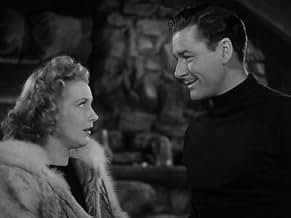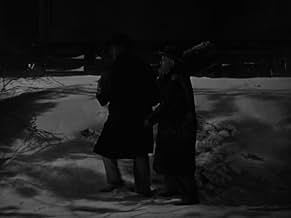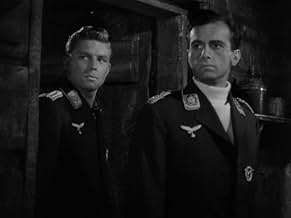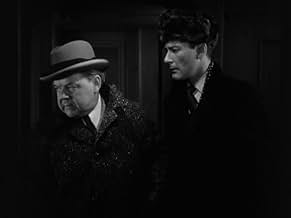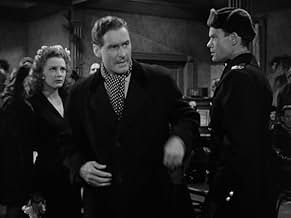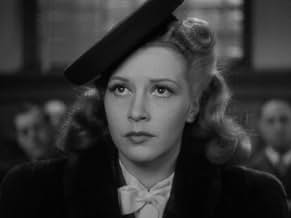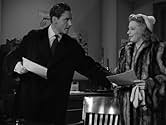IMDb RATING
6.6/10
1.7K
YOUR RATING
A Canadian Mountie of German descent feigns disaffection with his homeland in hopes of infiltrating and thwarting a Nazi sabotage plot.A Canadian Mountie of German descent feigns disaffection with his homeland in hopes of infiltrating and thwarting a Nazi sabotage plot.A Canadian Mountie of German descent feigns disaffection with his homeland in hopes of infiltrating and thwarting a Nazi sabotage plot.
Warren Douglas
- Sergeant
- (scenes deleted)
Richard Allord
- Jochim Preisser
- (uncredited)
John Alvin
- Orderly
- (uncredited)
Robert Ashley
- German Ski Trooper
- (uncredited)
Joe Brooks
- Nazi Prisoner
- (uncredited)
Glen Cavender
- Workman
- (uncredited)
Donald Chaffin
- Nazi Prisoner
- (uncredited)
Noble 'Kid' Chissell
- Lodge Guest
- (uncredited)
Ken Christy
- Winnipeg Police Desk Sergeant
- (uncredited)
Featured reviews
Errol Flynn was a fascinating screen presence. Just look at how many books have been written about him including a couple he wrote himself. I found a good dozen on Amazon before I stopped counting. Some well-known actors and filmmakers often have only one biography or even none at all.
"Northern Pursuit" isn't the best of his movies, but it is Flynn at his best. He looks in great shape despite the fact that he had a dicky ticker, a bad back, tuberculosis, a couple of exotic diseases picked up along the way and a liver that was in more danger of destruction than any target of the Nazis in the film.
Set in Canada during WW2, Errol plays Steve Wagner, a Royal Canadian Mountie of German Ancestry whose loyalty is questioned when he comes across Nazi secret agents who are planning to bomb a canal that is critical to the Allied war effort.
Although the story feels cobbled together, the film looks good. Most of it was shot on the sound stage and no doubt a great deal of talcum powder and papier mache was employed, but the sequence where a U-Boat breaks through the ice and scenes such as the avalanche are brilliantly staged.
However the stars make the film. Although Errol was rarely upstaged, Helmut Dantine was Warner's go-to Nazi guy during the war years. He plays Colonel Hugo von Keller in this film. The reason why Dantine was more effective than many screen Nazis at the time was the degree of intelligence with which he approached his roles. He was no off-the-rack, monocled Nazi stereotype, he came across as vigorous, smart and fanatical; a formidable enemy, he was also good looking and often got the best lines.
If you like the stars, and Flynn was absolutely unique, then there is much to enjoy here. In fact the film was a bit of a turning point for him- he even got a laugh with an in-joke at the end alluding to his recent acquittal on rape charges. From that point on he went along with the joke about his sexual prowess although those who knew him felt that it hurt his desire to be taken seriously as an actor.
Finally, for anyone with a sense of history, "Northern Pursuit" is a fascinating insight into what audiences were watching during the war even if they took it all with a generous pinch of salt.
"Northern Pursuit" isn't the best of his movies, but it is Flynn at his best. He looks in great shape despite the fact that he had a dicky ticker, a bad back, tuberculosis, a couple of exotic diseases picked up along the way and a liver that was in more danger of destruction than any target of the Nazis in the film.
Set in Canada during WW2, Errol plays Steve Wagner, a Royal Canadian Mountie of German Ancestry whose loyalty is questioned when he comes across Nazi secret agents who are planning to bomb a canal that is critical to the Allied war effort.
Although the story feels cobbled together, the film looks good. Most of it was shot on the sound stage and no doubt a great deal of talcum powder and papier mache was employed, but the sequence where a U-Boat breaks through the ice and scenes such as the avalanche are brilliantly staged.
However the stars make the film. Although Errol was rarely upstaged, Helmut Dantine was Warner's go-to Nazi guy during the war years. He plays Colonel Hugo von Keller in this film. The reason why Dantine was more effective than many screen Nazis at the time was the degree of intelligence with which he approached his roles. He was no off-the-rack, monocled Nazi stereotype, he came across as vigorous, smart and fanatical; a formidable enemy, he was also good looking and often got the best lines.
If you like the stars, and Flynn was absolutely unique, then there is much to enjoy here. In fact the film was a bit of a turning point for him- he even got a laugh with an in-joke at the end alluding to his recent acquittal on rape charges. From that point on he went along with the joke about his sexual prowess although those who knew him felt that it hurt his desire to be taken seriously as an actor.
Finally, for anyone with a sense of history, "Northern Pursuit" is a fascinating insight into what audiences were watching during the war even if they took it all with a generous pinch of salt.
Reading the other IMDb reviews of Northern Pursuit, I began to wonder if the monkey-see-monkey-do reviewers trashing it watched the same movie I did! Or if they watched it at all. This Mounties versus Nazis picture bears little resemblance, as claimed, to The 49th Parallel and even less to Across The Pacific.
From the opening scene with a German submarine breaking through the ice in Hudson Bay to the climatic showdown in a bomber aloft, Northern Pursuit is high-powered excitement all the way. Not surprisingly, with all the high-powered talent Warner Brothers threw into this enjoyable World War II action picture. Top action director Raoul Walsh directs top action star Errol Flynn with a script by popular western writer Frank Gruber and high class novelist William Faulkner. Solid support is provided by Helmut Dantine, reprising his ruthless Nazi officer from Edge Of Darkness (see my review), perky Julie Bishop, Tom Tully, John Ridgely, and Gene Lockhart in another of what was becoming his stock sneaky, Nazi sympathizer role. First rate camera work by Sid Hickox and the smooth editing typical in movies of this era blends studio sets and Idaho ski resort locations with skillfully dovetailed backdrop matting to so successfully convince us we were above the Artic Circle, it gave me a chill at times. The action is propelled along by one Adolphe Deutsch's better scores, enlivened by some input by the great Max Steiner. The story of German descent Mountie Flynn penetrating a Nazi-sympathizing Canadian spy organization co-operating with escaped German prisoners of war maintains suspense and interest throughout. The sharply directed action includes an avalanche, a prison camp breakout, a hair-raising ski chase, and a shoot-out in a mine shaft. Characterization and acting are top notch. Dantine's Nazi Colonel is particularly well realized. This Austrian refugee actor no doubt knew what real-life Nazis were like. He had had to flee his home country because because of his anti-Nazi activities.
While not a classic of the genre like Edge Of Darkness, Nothern Pursuit is a top "A" production war/intrigue thriller, effective WWII propaganda yet enjoyable, exciting, smooth entertainment from Warner Brothers' and Old Hollywood's Golden years.
From the opening scene with a German submarine breaking through the ice in Hudson Bay to the climatic showdown in a bomber aloft, Northern Pursuit is high-powered excitement all the way. Not surprisingly, with all the high-powered talent Warner Brothers threw into this enjoyable World War II action picture. Top action director Raoul Walsh directs top action star Errol Flynn with a script by popular western writer Frank Gruber and high class novelist William Faulkner. Solid support is provided by Helmut Dantine, reprising his ruthless Nazi officer from Edge Of Darkness (see my review), perky Julie Bishop, Tom Tully, John Ridgely, and Gene Lockhart in another of what was becoming his stock sneaky, Nazi sympathizer role. First rate camera work by Sid Hickox and the smooth editing typical in movies of this era blends studio sets and Idaho ski resort locations with skillfully dovetailed backdrop matting to so successfully convince us we were above the Artic Circle, it gave me a chill at times. The action is propelled along by one Adolphe Deutsch's better scores, enlivened by some input by the great Max Steiner. The story of German descent Mountie Flynn penetrating a Nazi-sympathizing Canadian spy organization co-operating with escaped German prisoners of war maintains suspense and interest throughout. The sharply directed action includes an avalanche, a prison camp breakout, a hair-raising ski chase, and a shoot-out in a mine shaft. Characterization and acting are top notch. Dantine's Nazi Colonel is particularly well realized. This Austrian refugee actor no doubt knew what real-life Nazis were like. He had had to flee his home country because because of his anti-Nazi activities.
While not a classic of the genre like Edge Of Darkness, Nothern Pursuit is a top "A" production war/intrigue thriller, effective WWII propaganda yet enjoyable, exciting, smooth entertainment from Warner Brothers' and Old Hollywood's Golden years.
Northern Pursuit (1943)
A solid, serious film that shouts its political message too loudly, but is so unusual, and potentially scary it remains interesting for anyone into WWII films. Truly fascinating is the setting—the north woods of Canada in winter—and the involvement of Native Americans, who side with the Nazis for the simple reason that that means siding against Canada. (This is addressed in some brutal killings partway through.) The key plot idea is that a group of expert Nazis might actually sneak into remote areas of the country to perform acts of sabotage.
The movie audience here is mostly in the United States, to be sure (Canada's population is so small it is always a secondary concern from the studio's point of view). And the leading actor, Errol Flynn, takes on the larger issues well. That is: devotion to good, personal sacrifice to defeat the enemy, and providing an example of moral uncertainty resolving itself as the circumstances become clear. The issues he faces (in Canada) applied to the U.S. equally.
Canada, to be sure, entered the war officially with Great Britain in 1939. But by 1943 the U.S. was also officially fighting. Cooperation between the two neighbors was a given, overall, but they had different national priorities to smooth out. Flynn was so famous at the time, despite (or because of) some personal scandal, he carried the movie.
But it's cobbled together stuff, quasi-propaganda. None of it was shot in Canada, though it's convincing enough. The romance is really almost superfluous, but it gives of course the audience that extra layer to swoon about, briefly. Most viewers will find a lot of this formulaic and rough sledding, but it isn't terrible, and the themes have lasting power.
A solid, serious film that shouts its political message too loudly, but is so unusual, and potentially scary it remains interesting for anyone into WWII films. Truly fascinating is the setting—the north woods of Canada in winter—and the involvement of Native Americans, who side with the Nazis for the simple reason that that means siding against Canada. (This is addressed in some brutal killings partway through.) The key plot idea is that a group of expert Nazis might actually sneak into remote areas of the country to perform acts of sabotage.
The movie audience here is mostly in the United States, to be sure (Canada's population is so small it is always a secondary concern from the studio's point of view). And the leading actor, Errol Flynn, takes on the larger issues well. That is: devotion to good, personal sacrifice to defeat the enemy, and providing an example of moral uncertainty resolving itself as the circumstances become clear. The issues he faces (in Canada) applied to the U.S. equally.
Canada, to be sure, entered the war officially with Great Britain in 1939. But by 1943 the U.S. was also officially fighting. Cooperation between the two neighbors was a given, overall, but they had different national priorities to smooth out. Flynn was so famous at the time, despite (or because of) some personal scandal, he carried the movie.
But it's cobbled together stuff, quasi-propaganda. None of it was shot in Canada, though it's convincing enough. The romance is really almost superfluous, but it gives of course the audience that extra layer to swoon about, briefly. Most viewers will find a lot of this formulaic and rough sledding, but it isn't terrible, and the themes have lasting power.
Attractive Canadian setting and interesting plot start-up degenerates into standard action flick with shootouts between bad guys and good guys. Well done and acted, but little plot interest the second half.
Although not quite as gripping as "Desperate Journey", or as marvelously sprawling as "49th Parallel", this slick film is everything you could ask for in a WWII actioner--even more, with Errol Flynn teaming up with Raoul Walsh. The acting is good, and the direction is taut and entertaining, with writers Bessie and Gruber providing a suspenseful story line concerning a nazi spy(Dantine) captured in Canada by a Royal Mountie(Flynn), the spy's escape from prison camp, and Flynn's efforts to thwart Dantine's nefarious mission in the great white north(and a dastardly mission it is, too--those dirty Nazis!).
Adolph Deutsch scores a cleverly subtle soundtrack to raise the suspense quotient, as he did for "High Sierra" and "The Maltese Falcon". Just the "Kick 'em in the Axis" kind of movie to watch, if you've already seen and liked "Tartu" and "The Commandos Strike At Dawn".
Adolph Deutsch scores a cleverly subtle soundtrack to raise the suspense quotient, as he did for "High Sierra" and "The Maltese Falcon". Just the "Kick 'em in the Axis" kind of movie to watch, if you've already seen and liked "Tartu" and "The Commandos Strike At Dawn".
Did you know
- TriviaErrol Flynn was criticized for playing heroes in World War II movies. Tony Thomas in his book "Errol Flynn: The Spy Who Never Was" states that Flynn had tried to enlist in every branch of the armed services but was rejected as unfit for service on the grounds of his health--he had a heart condition, tuberculosis, malaria and a back problem. He felt he could contribute to America's war effort by appearing in such films as L'ange des ténèbres (1943), Du sang sur la neige (1943), Bombardiers en piqué (1941), Aventures en Birmanie (1945) and Saboteur sans gloire (1944). Reportedly, he was at his most professional and cooperative while working on these movies. Warner Bros. apparently did not discuss the state of his health, as it wished to keep it quiet for fear that it would damage his box-office draw.
- GoofsNear the end the Nazis' plane is shown spiraling over and over in exterior shots, but in shots in the plane's interior it's going straight down, not spinning out of control.
- Quotes
Angus McBain: I have a very derogatory opinion of policeman, in general, and Steve, in particular.
Laura McBain: You're not going to marry him, I am.
Angus McBain: McBain's daughter the wife of a policeman! McBain's daughter stuck in a tradin' post!
Laura McBain: What makes McBain's daughter so wonderful?
Angus McBain: McBain!
- ConnectionsFeatured in Hollywood on Trial (1976)
- SoundtracksThe Bonnie Banks O' Loch Lomond
(ca 1745) (uncredited)
Lyrics by Robert Burns
Played off-screen on piano at the hotel
- How long is Northern Pursuit?Powered by Alexa
Details
Box office
- Budget
- $1,290,000 (estimated)
- Runtime1 hour 33 minutes
- Color
- Aspect ratio
- 1.37 : 1
Contribute to this page
Suggest an edit or add missing content



